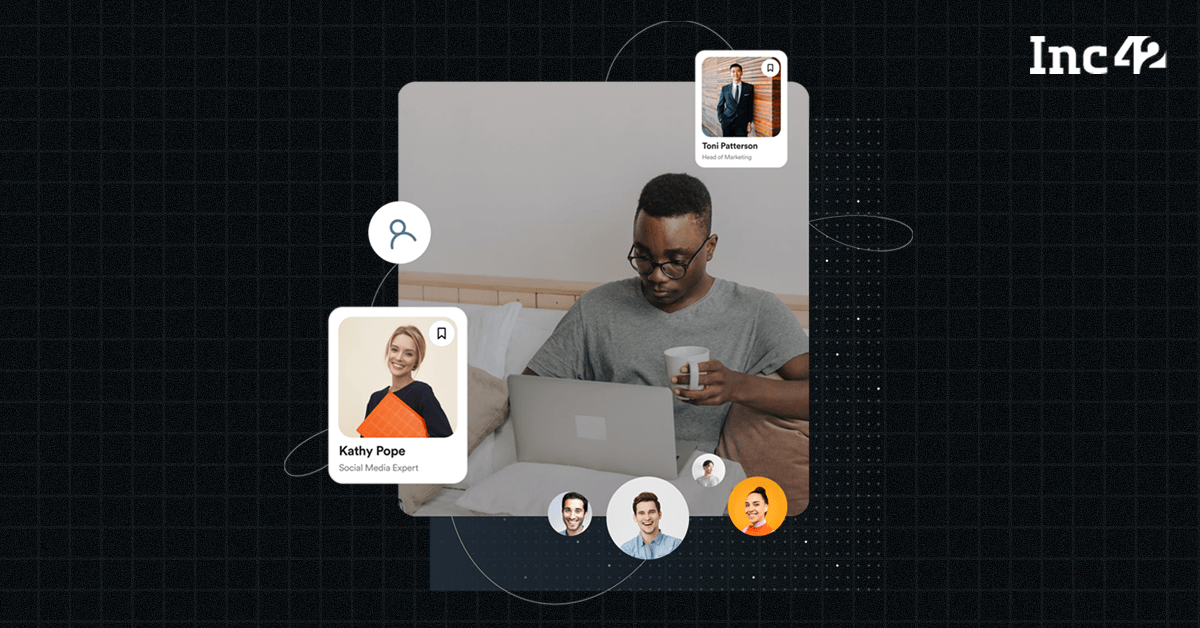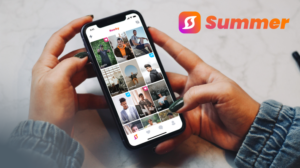“For us, it is a friendship of 12 years. Right from the beginning, we trusted each other and knew that we had to give each other space. That is the only way a CTO can think of innovation, and the CEO can think of the business and its growth. Cofounders will always require that kind of trust and space to make it a success.” — Mayank Agarwal, cofounder and CTO, Hubilo.
This understanding between Agarwal and his cofounder Vaibhav Jain has enabled the duo to scale their startup through various market conditions — pivoting and updating with every major industry shift.
Hubilo was started in 2015 as a virtual networking platform and currently operates as an end-to-end virtual event platform, with 40% of the customer base in the US, while the APAC and the EU account for 25% each. Its esteemed clientele includes the United Nations, Walmart, AB InBev, Roche Pharma, Echo, and GITEX.
Earlier, the startup told Inc42 that it shifted to live virtual events 26 days into the 2020 lockdowns and since then have managed to onboard more than 750 clients from 100+ countries and engaged with more than 100 Mn attendees through its portfolio of 10K+events.
When asked about Hubilo’s inception, Agarwal recalled that his cofounder always had an entrepreneurial mindset and the vision to start his company. “After college, I was working for an IoT startup when he (Jain) called and asked me to join his startup and build an in-house tech team. And I said yes without thinking twice. I just knew that if he had started something, it would grow big.”
But when they started as a virtual networking platform in 2015, the market was not ready for it. It was when Zoom or Google Meet or Meet Now had not become part and parcel of our daily lives as they are now in a pandemic-hit world. People were apprehensive of the virtual world, and live-streaming of virtual events was anything but niche. But all that changed in 2020 as the Corona crisis brought life (and the economy) to a shuddering halt.
While businesses across sectors saw their revenues hit rock bottom, virtual networking was among the few markets that witnessed a surge. By then, almost all organisations had started using these platforms for their day-to-day operations, especially as the work-from-home culture flourished due to long spells of lockdowns across the country.
As realisation dawned that the world would not return to pre-Covid normalcy anytime soon, new virtual event platforms hit the market, and event planners started exploring those. But none of these platforms had the tech stack that could help enterprises host large-scale events.
Understanding the new challenge, Hubilo decided to tap into the opportunity. “We experimented and added a video networking platform to our existing one. We did this in 20 days with a small team of 35-40 people. Out of them, only 10 were engineers. In those 20 days, we launched our new platform and hosted a very successful event of around 300 attendees,” added Agarwal.
After hosting the video-integrated event, Hubilo fully realised the potential in this space and started adding more features to its platform. Since its leap of tech, the company has hosted large-scale events — — for the Indian entities of businesses such as Publicis Sapient (TLG India), Nivea India, Reliance Jio, Schneider Electric, and George P. Johnson.
Here are the edited excerpts from Inc42’s interaction with Mayank Agarwal as the CTO charts the tech and innovation at Hubilo and his learnings through the pivots and growth.

Inc42: Tell us about the initial market hesitancy regarding virtual events. What are the key challenges, and how advanced is the Hubilo platform to counter them?
Mayank Agarwal: Hosting an event is an art. When you do it, you have to drive attendee participation and engagement along with the sessions, and it is difficult. In physical events, there are options of setting up stalls, booths, and more. But the virtual event itself becomes a venue, and you have to do everything inside it.
In the beginning, just as the pandemic hit, brands were hesitant, majorly because of the heavy dependence on technology. If one thing goes south, the entire experience will be ruined. But four or five months down the line, they started noticing the stability of these platforms. Not just Hubilo but all other event platforms that are robust enough. So, it’s all about trusting the platform.
Going through this entire experience also made us realise that it is crucial to ensure that the event and the attendee experiences remain flawless for event tech platforms like ours. Therefore, we always look at how we drive this journey on our platform through engaging and immersive event experiences.
Inc42: What is the role of data and analytics in a successful virtual event? How can brands ensure the success of their events?
Mayank Agarwal: It is important to look at the data from past events that can help inform all departments of a marketing organisation what parts of the events resonate the most with audiences. Using event technology, organisers can understand more than who liked an event. They can also understand how to tailor every event experience to the individual before, during, and after the event.
People like engaging content, especially when they can engage in it with their friends and colleagues. This is one of the reasons that the Netflix “watch party” feature has been a huge success on the platform. One engagement strategy that has worked successfully for Hubilo is to think of events from a broadcasting perspective rather than just trying to replicate a live event. Ultimately, people should be able to attend an event from anywhere and engage with the content with other attendees, whether they’re in-person or virtual.
Inc42: You pivoted and launched a new product in 26 days. You have also released Hubilo 2.0 with more features. How did you achieve this feat?
Mayank Agarwal: We started with a very basic networking platform in 2015. And then, we experimented with the video component. But even as we saw growth, we knew it was not a sustainable model.
So, to understand the market and what kind of features we have to bring into the market, we did what we have always done. We focussed on what our customers were saying.
You may say this product has been built on customer feedback. We collected a lot of feedback, especially six months into the pandemic, asking them what needed to be built and what they wanted to see on the virtual networking platform. Through that, we also understood the kind of service-level agreements we must provide, the tweaks and the upgrades we would have to make, and more.
Plus, we had a team working on scaling, stability, and platform security at the same time, making sure that we would be GDPR-ready as well. After all, we had to be open for the regular market. We also got the ISO 27001 certification in those seven-eight months. So, everything was running parallel back then.
Inc42: Hubilo has worked with global brands. How do you ensure that brands can leverage the platform’s potential to the fullest?
Mayank Agarwal: Well, we believe that Hubilo is a global platform. It is not limited to any geography, and our clients across the globe understand that the digital world is borderless. The credit for this should go to our client success and onboarding teams. Understanding virtual events and their complexities could be tough. Therefore, our first focus is educating our clients on how to think about events from a hybrid or virtual perspective, how to engage with the attendees, how to scale the events further, and more.
Inc42: What are the biggest challenges when you work with clients across sectors and from all over the world?
Mayank Agarwal: A major challenge is language, of course. When you want to reach out to different regions, you must have access to different languages. It was a key reason for the new platform. We built the structure at the backend so that any language can be added within a day. So far, the platform supports 10 languages, and we will be adding more very soon. Our most recent event that Hubilo hosted had a sign language interpreter as well, making the event more inclusive.
Inc42: What about the sudden client surge amid the pandemic? What changes were required to your operations and business model to handle it?
Mayank Agarwal: We have a very responsive customer support team, and we have virtually no response time as a customer service manager is proactively on-call during practice sessions, during the event should any problems arise, and after the event if the customer needs help interpreting the data. They are not just providing support over chat or email. The customer service manager is a part of the overall event team and is available to help in real-time at every event. During the surge, we expanded our team, and now we have 60-70 qualified engineers who know how to solve complex issues. We also revamped our infrastructure and tech stack to support big events as we knew we must be ready for it. All we had was a grace period of three-four months because planners would take that time to adjust to the virtual event space. Those months were like a war period for us. We grew across all departments.
Inc42: The world is catching on to hybrid events. What can we expect from Hubilo to amplify that experience?
Mayank Agarwal: To accommodate hybrid events on the platform, we have made a lot of updates to our recently launched app. We are now providing attendees and speakers with a one-to-one video calling option besides lounge and networking options and more. We have also opened our platform to a lot of vendors, making it more flexible.
Hubilo has recently launched a check-in app to help organisers improve safety, security, and compliance for their attendees, speakers, and teams — both in physical and virtual events.
Inc42: Finally, what’s next in your product playbook and global expansion plan?
Hubilo has the largest suite of engagement and gamification features on the market and we’re continuing to add to that suite of features so that people can engage wherever they are, on any device. I don’t want to get into our global expansion plans just yet, as the digital world is ultimately borderless and our events can be hosted from anywhere and in any timezone. That’s one of the biggest benefits of a virtual event.



![Read more about the article [Budget 2022] Govt to introduce EV battery swapping policy: FM Nirmala Sitharaman](https://blog.digitalsevaa.com/wp-content/uploads/2022/02/Featured-image-01-1643704133368-300x150.png)





